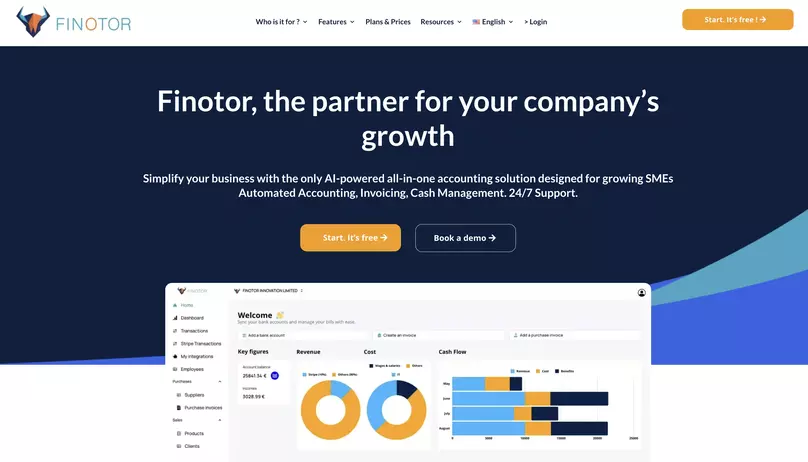Contents
Cost accounting for a startup, also known as management accounting, allows you to track costs and revenues in detail, giving you a clear and accurate picture of your company’s financial health. Why is it so important for your start-up, and how can you implement it effectively?
In the ruthless, bloody world of startups, where every decision can make or break the business, understanding the financial landscape is crucial. Cost accounting, a vital subset of managerial accounting, offers startup founders the insights needed to make informed decisions about pricing, budgeting, and resource allocation. By systematically tracking and analyzing costs, startups can better control expenses, optimize operations, and pave the way for sustainable growth. Whether you’re just getting started or looking to scale, mastering cost accounting is an essential step towards ensuring your startup’s financial health and long-term success.
Prerequisites: what is cost accounting?
Cost accounting is a method of accounting that analyses a company’s costs and revenues in detail. Unlike general accounting, which records overall financial transactions, cost accounting focuses on breaking down costs by product, project, department or any other relevant unit of analysis. This enables you to understand precisely where and how money is spent and earned.
Cost accounting is a specialized branch of accounting that delves into the granular details of a company’s costs and revenues. Unlike general financial accounting, which provides a broad overview of a company’s financial status by recording overall transactions, cost accounting zeroes in on the specifics. It systematically breaks down and analyzes costs associated with various facets of the business, such as individual products, projects, departments, or other relevant units of analysis.
The core objective of cost accounting is to offer a clear, detailed view of the financial implications of each aspect of the business. For example, by allocating costs to specific products or departments, cost accounting enables a company to determine which areas are most profitable and which may be draining resources. This analysis helps business owners and managers make informed decisions about pricing, budgeting, and resource allocation.
In essence, cost accounting transforms raw financial data into actionable insights. It provides answers to critical questions such as:
- Which products or services are the most profitable?
- How efficiently are resources being utilized across different departments?
- Where can the company reduce costs without compromising quality?
- What is the true cost of manufacturing a product or delivering a service?
By focusing on these questions, cost accounting helps businesses optimize their operations, set more accurate pricing strategies, and ultimately enhance profitability. For startups, in particular, where every dollar counts, understanding and implementing cost accounting can be the difference between success and failure. It ensures that you have a firm grasp on the financial pulse of your company, enabling you to navigate challenges and seize opportunities with confidence.
Cost accounting isn’t just a financial practice; it’s a critical tool that empowers startups to navigate the complexities of growth and competition. By enabling startups to track costs and revenues, make strategic decisions, manage resources effectively, assess performance, and prepare accurate financial forecasts, cost accounting lays the foundation for sustainable success.
1.1 Tracking Costs and Revenues
For a startup, understanding where every dollar is coming from and where it’s going is crucial. Cost accounting enables you to closely monitor the costs and revenues associated with each product, project, or department. For example, imagine a startup that develops two different software products: Product A and Product B. Through cost accounting, the company can break down all the costs related to each product, including development, marketing, and customer support.
- Product A: The company discovers that while the initial development costs were high, ongoing support and maintenance are relatively low. Revenues from Product A are stable, and its profit margins are healthy.
- Product B: On the other hand, Product B is more expensive to support, with frequent updates and higher customer service demands. Despite similar sales figures to Product A, the profit margins are much thinner due to these ongoing costs.
With this insight, the startup can decide to focus more resources on expanding Product A, perhaps by increasing its marketing budget or exploring new markets, while re-evaluating the strategy for Product B. This might include optimizing support processes or even reconsidering whether to continue investing in Product B at all. This kind of informed decision-making is possible only with detailed cost and revenue tracking provided by cost accounting.
1.2 Strategic Decision-Making
Strategic decisions in a startup often determine its path to growth or decline. Cost accounting plays a vital role by providing detailed financial data on profit margins, production costs, and the performance of various business segments. For instance, let’s say a startup is considering launching a new service. Cost accounting helps estimate the potential costs involved in developing and delivering this service, from research and development to marketing and distribution.
Consider a tech startup evaluating whether to add a premium feature to its existing app. By analyzing the cost data associated with the development and projected revenues, the management can determine if the potential profits justify the investment. If cost accounting reveals that the premium feature would only yield marginal returns, the startup might decide to allocate those resources to enhancing existing features or improving customer acquisition strategies instead.
1.3 Resource Management
In the startup environment, resources are often limited, making efficient resource management essential. Cost accounting helps startups allocate resources optimally by identifying areas that generate the most value and those that require improvement. For example, if a startup is running multiple marketing campaigns across different channels, cost accounting can help determine which channels are delivering the best return on investment (ROI).
Let’s say a startup is using both social media advertising and email marketing. Cost accounting shows that while the social media campaigns have a higher upfront cost, they drive significantly more customer conversions compared to the relatively low-cost email campaigns. With this knowledge, the startup might decide to shift more of its marketing budget towards social media, thereby maximizing the effectiveness of its resources.
1.4 Performance Assessment
Regular performance assessment is key to staying on track with business goals. Cost accounting allows startups to evaluate the performance of different segments of their business in detail. By comparing actual costs with forecasted costs, startups can identify variances and analyze their causes.
Imagine a startup that forecasts a budget of $10,000 for developing a new feature, but actual costs come in at $15,000. Cost accounting can help pinpoint the reasons for this variance—perhaps there were unexpected challenges in the development process, or maybe the team underestimated the time required to complete the project. By understanding these discrepancies, the startup can take corrective actions, such as adjusting future budgets or improving project management practices, ensuring that similar overruns do not occur again.
1.5 Preparing Financial Forecasts
Accurate financial forecasting is essential for long-term planning and securing funding from investors. Cost accounting provides the detailed data necessary for reliable financial forecasts. By analyzing past cost and revenue trends, startups can make informed predictions about future financial needs.
For instance, a startup preparing to pitch to investors will need to present a clear financial plan that includes projections for revenue growth, operating costs, and profitability. Cost accounting allows the startup to base these projections on solid data rather than guesswork. If the startup has been tracking the cost of acquiring customers, for example, it can accurately forecast how much additional funding will be needed to scale its marketing efforts to reach a larger audience. This level of detail not only helps in securing investment but also ensures that the startup is prepared for future financial challenges.
How can you implement cost accounting in your start-up?
2.1 Use advanced financial management software
Financial management software such as Finotor offers advanced features for cost accounting. They allow you to break down costs and revenues in detail, generate customised reports and visualise financial data in a clear and understandable way.
2.2 Define cost and revenue centres
For effective cost accounting, it is important to define relevant cost and revenue centres. These may include specific products, projects, departments or teams. By segmenting activities in this way, it becomes easier to track the costs and revenues associated with each centre.
2.3 Collect and analyse data
Cost accounting requires regular collection and analysis of financial data. It is important to put processes in place to record costs and revenues accurately and regularly. Data should be analysed regularly to identify trends and variances.
2.4 Training the finance team
To implement cost accounting effectively, it is crucial to train the finance team in the specific techniques and tools. Proper training ensures that data is recorded and analysed correctly, and that the reports generated are accurate and useful.
2.5 Working with a specialist accountant
Working with a chartered accountant can greatly facilitate the implementation of cost accounting. Accountants have the expertise to set up cost accounting systems, analyse financial data and provide strategic advice based on these analyses.
Cost accounting for your start-up with Finotor
At Finotor, we firmly believe that cost accounting is an indispensable tool for start-ups and scale-ups. By implementing rigorous cost accounting, start-ups can improve their profitability, optimise their processes and prepare reliable financial forecasts.
Cost accounting is more than just a financial tool—it’s the backbone of informed decision-making for any startup. By meticulously tracking costs, analyzing financial data, and understanding where your resources are going, you gain the power to steer your startup towards profitability and growth. Implementing cost accounting practices from the outset can help you identify inefficiencies, set competitive pricing strategies, and make data-driven decisions that will keep your business agile and responsive to market changes.
As your startup evolves, the insights gained from cost accounting will continue to be an invaluable asset, ensuring that you not only survive but thrive in a competitive landscape. Embrace cost accounting, and turn your financial data into a roadmap for success.
If you would like to find out more about implementing cost accounting in your start-up, please contact our team!
Frequently Asked Questions (FAQ) About Cost Accounting for Startups
1. What is cost accounting, and why is it important for startups?
Cost accounting is a method of accounting that involves tracking, analyzing, and managing costs associated with a company’s operations. For startups, it’s essential because it provides detailed insights into where money is spent and earned, helping to optimize profitability, manage resources efficiently, and make informed strategic decisions.
2. How does cost accounting differ from financial accounting?
While financial accounting focuses on providing an overall picture of the company’s financial health to external stakeholders, cost accounting delves into the specifics of costs and revenues associated with individual products, projects, or departments. Cost accounting is primarily used internally to aid in decision-making and improve operational efficiency.
3. How can cost accounting help my startup grow?
Cost accounting helps startups grow by identifying profitable products or services, optimizing resource allocation, and providing data-driven insights that support strategic planning. It enables startups to refine their pricing strategies, reduce waste, and plan for future financial needs, all of which are crucial for sustainable growth.
4. What are the basic steps to implement cost accounting in a startup?
To implement cost accounting in your startup:
- Identify cost centers: Determine which products, projects, or departments will be analyzed.
- Track costs: Record all costs associated with these centers, including materials, labor, and overhead.
- Analyze costs: Break down the data to see where money is being spent and earned.
- Use the data: Apply the insights gained to make informed decisions about pricing, budgeting, and resource allocation.
5. Can cost accounting be used to forecast future financial needs?
Yes, cost accounting is a valuable tool for preparing financial forecasts. By analyzing past and current cost trends, startups can predict future expenses, plan for growth, and ensure they have the resources needed to scale effectively.
6. How does cost accounting aid in pricing decisions?
Cost accounting helps startups understand the true cost of producing a product or delivering a service. By knowing the exact costs, startups can set prices that cover expenses and generate a profit. It also helps in adjusting prices based on market conditions or when launching new products.
7. What common challenges do startups face with cost accounting, and how can they be overcome?
Common challenges include accurately tracking costs, managing data from various sources, and ensuring all relevant costs are captured. Startups can overcome these challenges by using cost accounting software, regularly reviewing and updating cost data, and ensuring all team members are aligned on the importance of accurate cost tracking.
8. Do I need specialized software for cost accounting in my startup?
While specialized cost accounting software can make the process easier and more accurate, especially as your startup grows, it’s not always necessary in the beginning. Many startups start with basic spreadsheets or simple accounting software and gradually transition to more sophisticated tools as their needs evolve.
9. How frequently should cost accounting reports be reviewed in a startup?
Cost accounting reports should be reviewed regularly—monthly or quarterly is common practice. However, the frequency may increase depending on the startup’s stage and the complexity of its operations. Regular reviews help ensure that decisions are based on up-to-date financial information.
10. How does cost accounting impact a startup’s ability to secure funding?
Investors and lenders look for startups with a clear understanding of their financial situation. Cost accounting provides detailed financial data that can be used to create accurate financial forecasts, demonstrate profitability, and show a well-managed business, all of which are attractive to potential investors.









